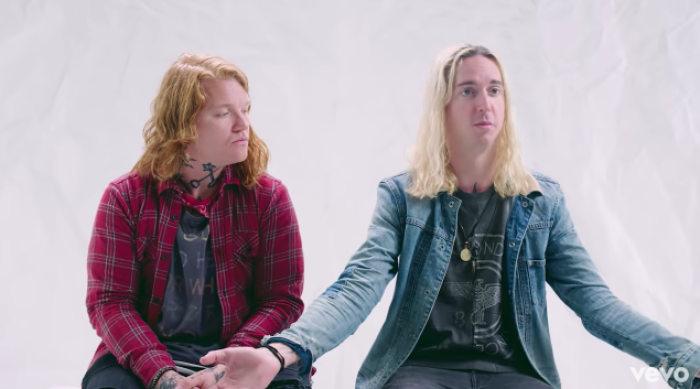Rock Band Underoath No Longer Identifies as Christian; Bandmate Says Church Is 'Selling a Product'

Members of the post-hardcore and heavy metal band Underoath have said they no longer identify as Christian, describing modern day churches as "selling a product" of perfection.
For more than 15 years, Underoath has been performing Christian hard rock to audiences worldwide. The band was started in Florida when the members were in high school and despite one breakup, numerous of lineup changes and overcoming drug addiction they're now back together, but are not exclusively Christian.
Two of the six band members, Aaron Gillespie and Spencer Chamberlain, have revealed that although the band has reunited they now reject organized "conservative" Christianity which they say has lost its "rebellious" roots and rejects imperfect people who are struggling with things such as substance abuse and addiction.
"If I were still a Christian, I'd probably be dead," Chamberlain says in a VEVO original video where the lead singer describes how he felt rejected by the Christian community whom he said had blamed him for the band's breakup due to his drug addiction.
Both he and Gillespie, the band's drummer, listed complaints they have with Christians today and the American Church.
"Christ was not a white man, He was not a Christian, He was a Jewish man, essentially got thrown out of his hometown and then He was murdered, real fringe stuff. Everything that Christianity was built on was essentially rebellious," Gillespie said. "Somewhere along the way, modern Christianity became conservative and I don't know how that happened."
Chamberlain added that the ideal presented by some pastors of them having a perfect Christian family that others can model if they live like they do is essentially just "selling a product."
The musicians further argued that churches today are too rule-based "that you are not allowed to question."
"Modern Christianity is made by people, all modern religions are, the organized part," Gillespie continued. ... "When you believe in the rules and not the reason [behind them], then you got an issue."
In a previous interview with The Christian Post, Mark R. Teasdale, an E. Stanley Jones associate professor of evangelism at Garrett-Evangelical Theological Seminary in Evanston, Illinois, said that a search for meaning in a postmodern culture appears to have challenged some to abandon deeply held beliefs about God.
"Before the time when evangelicalism arose, the focus was in making certain that we had absolutes. So the belief of modernity was the belief that there are absolutes. Everyone could have access to those absolutes if they simply use their reason appropriately and that those absolutes would hold no matter what the situation you're in," Teasdale told CP.
"What happens in postmodernity is that the idea of absolutes become far less important. Instead, we're looking at a time when narrative story becomes much more important. And so people are looking for something meaningful, a meaningful story to make sense of their lives."
As Chamberlain blamed the "Christian community" for "ruining Christianity," he noted that when he was struggling with his drug addiction it was nonChristians who provided the support he needed to get clean.
Underoath recently released their first album in eight years, Erase Me, and their Christian fans noticed some of the changes the band has made, such as the inclusion of a curse word in their single "On my Teeth." When confronted on social media by their deliberate secularism, the bandmates defended their expression on Twitter and emphasized that they no longer consider themselves a Christian band.
In another interview, Chamberlain said that they "couldn't grow musically" under the banner of Christianity and once they let it go they were "able to create again."
"Over time you become individuals, you become men or women," he told Revolver in a recent interview.
Chamberlain said that before they broke up a few years back they decide to remove faith from their content.
"There [are] certain guys in the band that are atheist and there's certain guys in the band that still believe, and some guys think we're in the science simulation. I just think it's OK for everyone to have their own thoughts and that wasn't allowed for a while," he added.
Editor's note: Warning: Offensive language can be heard at the 2:24 minute mark.




























